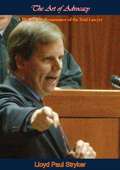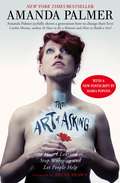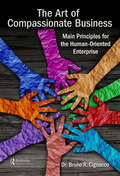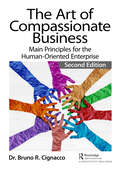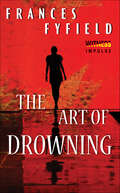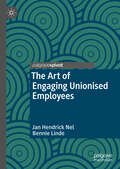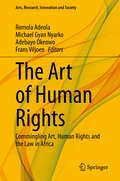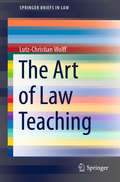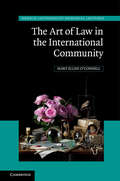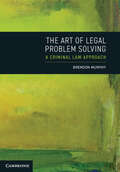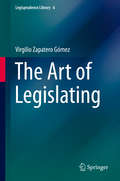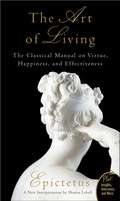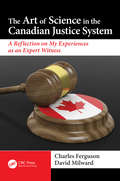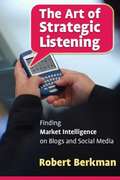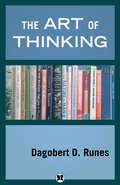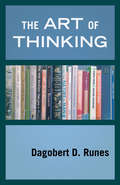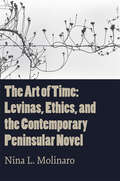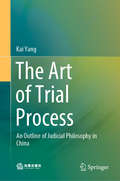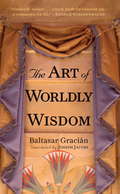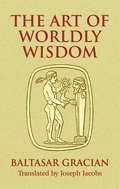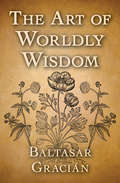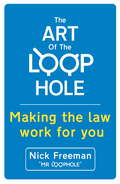- Table View
- List View
The Art of Advocacy: A Plea for the Renaissance of the Trial Lawyer
by Lloyd Paul StrykerIn this book, which was first published in 1954, U.S. defense attorney Lloyd Paul Stryker takes the reader through every step of a case: the first meeting with the client, the questions to find the facts, the arrival in court on the first day of the trial, the selection of jurors, the carefully collected information about the characters of the judge and the prosecuting attorney, the importance of the opening address and the summation. Above all, he reveals the fascinating art of cross-examination which he considered to be the greatest weapon in the arsenal of a trial lawyer.The author clears up for all time the matter of legal ethics, of a defense attorney’s responsibility to undertake a defense, and under what circumstances he must refuse it. Also, he tells wonderfully exciting stories about the famous trial lawyers of an earlier day—Martin W. Littleton, Daniel Webster, Rufus Choate—as well as such modern greats as Robert Jackson and John W. Davis.
The Art of Asking: How I learned to stop worrying and let people help
by Amanda PalmerREDISCOVER THE FORGOTTEN ART OF ASKING IN THIS NEW YORK TIMES BESTSELLING BOOK 'Amanda Palmer joyfully shows a generation how to change their lives' Caitlin Moran'To read Amanda Palmer's remarkable memoir about asking and giving is to tumble headlong into her world' Elizabeth Gilbert'The Art of Asking is a book about cultivating trust and getting as close as possible to love, vulnerability, and connection. Uncomfortably close. Dangerously close. Beautifully close' Brene BrownImagine standing on a box in the middle of a busy city, dressed as a white-faced bride, and silently using your eyes to ask people for money. Or touring Europe in a punk cabaret band, and finding a place to sleep each night by reaching out to strangers on Twitter. For Amanda Palmer, actions like these have gone beyond satisfying her basic needs for food and shelter - they've taught her how to turn strangers into friends, build communities, and discover her own giving impulses. And because she had learned how to ask, she was able to go to the world to ask for the money to make a new album and tour with it, and to raise over a million dollars in a month.In the New York TImes bestseller The Art of Asking, Palmer expands upon her popular TED talk to reveal how ordinary people, those of us without thousands of Twitter followers and adoring fans, can use these same principles in our own lives.
The Art of Asking: How I learned to stop worrying and let people help
by Amanda Palmer'When we really see each other, we want to help each other' - Amanda PalmerImagine standing on a box in the middle of a busy city, dressed as a white-faced bride, and silently using your eyes to ask people for money. Or touring Europe in a punk cabaret band, and finding a place to sleep each night by reaching out to strangers on Twitter. For Amanda Palmer, actions like these have gone beyond satisfying her basic needs for food and shelter - they've taught her how to turn strangers into friends, build communities, and discover her own giving impulses. And because she had learned how to ask, she was able to go to the world to ask for the money to make a new album and tour with it, and to raise over a million dollars in a month.In The Art of Asking, Palmer expands upon her popular TED talk to reveal how ordinary people, those of us without thousands of Twitter followers and adoring fans, can use these same principles in our own lives.
The Art of Compassionate Business: Main Principles for the Human-Oriented Enterprise
by Bruno R. CignaccoThere are several well-ingrained assumptions regarding the dynamics of work and business activities, which can be refuted. Some examples of these widespread assumptions in the business and work environments are: employees being viewed as commodities, competitors perceived as threats, companies’ resources seen as limited, and customers perceived as scarce and difficult, etc. All which leads to the question, "Is there a way to perform business activities more humanely?" This book challenges the reader to change the way they perform in business situations and become more focused on the human aspects of business activities. The users of this knowledge and those affected by them will undergo a profound transformation in the way they perform business activities. They will benefit from gradually testing and implementing the guidelines conveyed in this book, both in the business environment and the workplace. When readers put these principles into practice, positive ripple effects are bound to affect other stakeholders of the organization they work for or own. This book includes aspects related to mission and vision, passion, business mindset, organizational learning, improvement of business conversations, use of constructive criticism and improvement of relationships with the most relevant stakeholders (customers, suppliers, intermediaries, community, and employees, etc.). The book also includes a discussion of creativity and the innovation process, as well as other factors that create a healthy business environment. Extensive appendices include topics such as negotiation, marketing, use of social media and others.
The Art of Compassionate Business: Main Principles for the Human-Oriented Enterprise
by Bruno R. CignaccoThere are several well-ingrained assumptions regarding the dynamics of work and business activities, which can be refuted. Some examples of these widespread assumptions in business and work environments are employees being viewed as commodities, competitors perceived as threats, companies’ resources seen as limited, and customers perceived as scarce and difficult. All this leads to the question: "Is there a way to perform business activities more humanely?" The second edition of this book challenges the reader to change the way they perform in business situations and become more focused on the human aspects of business activities. The users of this knowledge and those affected by them will undergo a profound transformation in the way they perform business activities. They will benefit from gradually testing and implementing the guidelines conveyed in this book, both in the business environment and in the workplace. When readers put these principles into practice, positive ripple effects are bound to affect other stakeholders of the organisation they work for or own. The author has refreshed all the concepts and examples introduced in the first edition which include aspects related to mission and vision, passion, business mindset, organisational learning, improvement of business conversations, use of constructive criticism, and betterment of relationships with the most relevant stakeholders (customers, suppliers, intermediaries, community, employees, etc.). The author also includes a discussion of creativity and the innovation process as well as other relevant aspects related to a healthy business environment and provides various real-life examples of companies which have adopted a loving attitude towards their stakeholders – which has become so important in the current business environment.
The Art of Drowning
by Frances FyfieldA loner. A liar. A secret.Let the games begin.Accountant Rachel Doe leads a sheltered, beige-colored life… Until she meets Ivy, who is everything Rachel isn’t. Ivy is a wild child. She is charismatic and seductive, a charmer with tragedy in her past. The two women begin an intense and unexpected friendship.But, as the intimacy between them escalates, Rachel is drawn deeper into the darkness that surrounds Ivy—and the secrets that hide there. In the bestselling tradition of Gone Girl and Reconstructing Amelia, this riveting psychological thriller.
The Art of Engaging Unionised Employees
by Bennie Linde Jan Hendrick NelThis book introduces a framework to assist human resource practitioners and organisations embrace strategies that will drive high engagement levels within organisations with a union presence. The authors address established definitions of engagement and how they have been conceptualised in academic and practitioners’ literature, before exploring and unpacking circumstances that influence levels of engagement amongst employees in a unionised environment. In doing so, the framework introduced elaborates on approaches and interventions with the greatest potential to create, improve, and embed high levels of engagement within the unionised work environment.
The Art of Human Rights: Commingling Art, Human Rights and the Law in Africa (Arts, Research, Innovation and Society)
by Frans Viljoen Michael Gyan Nyarko Romola Adeola Adebayo OkeowoThis book highlights the use of art in human rights, specifically within Africa. It advances an innovative pattern of thinking that explores the intersection between art and human rights law. In recent years, art has become an important tool for engagement on several human rights issues. In view of its potency, and yet potential to be a danger when misused, this book seeks to articulate the use of arts in the human rights discourse in its different forms. Chapters cover how music, photography, literature, photojournalism, soap opera, commemorations, sculpting and theatre can be used as an expression of human rights. This book demonstrates how arts have become a formidable expression of thoughts and a means of articulating reality in a form that simplifies truth and congregates resolve to advance change.
The Art of Law Teaching (SpringerBriefs in Law)
by Lutz-Christian WolffWritten by an award-winning professor with over 25 years of experience, this book explains comprehensively the different facets of law teaching from the law teacher’s perspective. It uniquely covers numerous topics which have been ignored by the legal education literature so far, but which are of immense importance for the success of law students, law schools and—last but not least—the day-to-day work of law teachers themselves. These topics include the goals of law teaching, the factors that lead to successful law teaching, special characteristics of good law teachers, different ways of preparing for in-class success, face-to-face versus online teaching, the in-class teaching experience, assessments, teaching evaluations, the design of new courses and programmes, the teacher–student and the teacher–teacher relationship, the importance of teaching administration as well as the future of law teaching in the digital age. The author approaches various themes from the viewpoint of his own experience. He tells his very personal stories of classroom success and failure, of enthusiasm, fun and disappointments when dealing with law students, of accomplishments and frustrations when considering learning outcomes and of surprises when dealing with red tape. He thus allows the readership to grasp different aspects of law teaching in a very hands-own way and facilitates the understanding of the underlying often rather complex human-to-human relationships. This book should be in the bookshelf of any law teacher. As it covers a wide spectrum of so far unexplored legal education issues, it is also an invaluable source at the start of a law teaching career, but also for established law teachers who wish to reflect on their own teaching approaches. A rich body of cross-references to the existing literature makes the book a powerful tool for research on any aspect of legal education. Last but not least, the author’s ironic sense of himself and of the law teacher profession makes the book a very entertaining read for anybody who always wanted to know what law teaching really is (and is not) about.
The Art of Law in the International Community (Hersch Lauterpacht Memorial Lectures #23)
by Mary Ellen O'ConnellInternational law evolved to end and prevent armed conflict as much as for any other reason. Yet, the law against war appears weaker today than ever in its long history, evidenced by raging armed conflicts in which people are killed, injured, and forcibly displaced. The environment is devastated, and the planet impoverished. These consequences can be traced to the dominant ideology of realism. In 1946, Hersch Lauterpacht challenged that ideology by contrasting it with the idea of international law, composed of natural law, positive law, and process theory. The Art of Law in the International Community revives his vision, rebuilding the understanding of why international law binds, what its norms require, and how courts are the ideal substitutes for war. The secret to the renewal of international law lies in revitalizing the moral foundation of natural law through drawing on aesthetic philosophy and the arts.
The Art of Legal Problem Solving: A Criminal Law Approach
by Brendon MurphyThe Art of Legal Problem Solving: A Criminal Law Approach is a sophisticated skills book designed to help students develop the problem-solving techniques necessary for their legal careers. This succinct yet comprehensive book provides the perfect mix of general instruction and specific examples to encourage students to think about problems both in depth and broadly. It follows a clear roadmap presented in a logical progression, beginning with the fundamentals, fact finding and statutory interpretation before turning to the advanced areas of analysing and writing answers to problem questions. While written primarily for criminal law students, the skills imparted are generic and can be applied equally in any area of the law and in any jurisdiction. The Art of Legal Problem Solving is an indispensable work for law students who want to not only improve their problem-solving skills but master them.
The Art of Legislating (Legisprudence Library #6)
by Virgilio Zapatero GómezAny contemporary state presents itself as committed to the “rule of law”, and this notion is perhaps the most powerful political ideal within the current global discourse on legal and political institutions. Despite being a contested concept, the rule of law is generally recognised as meaning that government is bound in all its actions by fixed and public rules, and that these rules respect certain formal requirements and are enforced by an independent judiciary. This book focuses on formal legality and the question of how to achieve good laws—a topic that was famously addressed by the 18th century enlightened thinkers, but also by prominent legal scholars of our time. Historically, the canon of “good legislation” demanded generality, publicity and accessibility, and comprehensibility of laws; non-retroactivity; consistency; the possibility of complying with legal obligations and prohibitions; stability; and congruency between enacted laws and their application. All these are valuable ideals that should not be abandoned in today’s legal systems, particularly in view of the silent revolution that is transforming our legality-based “states of law” into jurisdictional states. Such ideals are still worth pursuing for those who believe in representative democracy, in the rule of law and in the dignity of legislation. The idea for the book stemmed from the author’s parliamentary and governmental experience; he was responsible for the Government of Spain’s legislative co-ordination from 1982 to 1993, which were years of intensive legislative production. The more than five hundred laws (and thousands of decrees) elaborated in this period profoundly changed all sectors of the legal order inherited from Franco’s dictatorship, and laid the foundations of a new social and democratic system. For an academic, this was an exciting experience, which offered a unique opportunity to put the theory of legislation to the test. Reflecting and elaborating on this experience, the book not only increases scholarly awareness of how laws are made, but above all, improves the quality of legislation and as a result the rule of law.
The Art of Living: The Classical Mannual on Virtue, Happiness, and Effectiveness (Plus Ser.)
by EpictetusEpictetus was born into slavery about A. D. 55 in the eastern outreaches of the Roman Empire. Sold as a child and crippled from the beatings of his master, Epictetus was eventually freed, rising from his humble roots to establish an influential school of Stoic philosophy. Stressing that human beings cannot control life, only how they respond to it, Epictetus dedicated his life to outlining the simple way to happiness, fulfillment, and tranquility. By putting into practice the ninety-three witty, wise, and razor-sharp instructions that make up The Art of Living, readers learn to successfully meet the challenges of everyday life and face life's inevitable losses and disappointments with grace. Epictetus's teachings rank among the greatest wisdom texts of human civilization. Sharon Lebell presents this esteemed philosopher's invaluable insights for the first time in a splendidly down-to-earth rendition. The result is the West's first and best primer for living the best possible life -- as helpful in the twenty-first century as it was in the first.
The Art of Post-Dictatorship: Ethics and Aesthetics in Transitional Argentina
by Vikki BellSince the end of the last dictatorship in 1983, Argentina’s visual artists and art-activists have been central to campaigns to demand the criminal prosecution of those initially granted amnesty and to a variety of commemorative projects. In The Art of Post-Dictatorship: Ethics and Aesthetics in Transitional Argentina Vikki Bell examines this involvement and intervention. She argues that the problematics that arise within the aesthetic realm cannot be understood solely through an art-historical approach; instead, they must be understood as a constitutive part of a broader collective endeavour. In this sense, the ‘art’ of post-dictatorship is not something that belongs to art or the artists themselves, but is about how the subjectivities and imaginations of new generations are constituted and entwined with questions of response, ethics and justice. It concerns how people align themselves between the past and the future. This book will be an invaluable resource for those studying the law, politics, art and sociology of contemporary Argentina as well as those concerned more widely with transitional justice and the politics of memory.
The Art of Science in the Canadian Justice System: A Reflection of My Experiences as an Expert Witness
by Charles Ferguson David MilwardPart autobiography, part thought piece, part references, the book takes an insightful look at the experience and cases of renowned paediatrician and forensic expert witness Dr. Charles Ferguson. The book presents the interaction of science and law as it applies, specifically, the Canadian courts, but the justice process as a whole. Dr. Ferguson’s experience—from a scientist and medical professional’s perspective—in dealing with lawyers, judges, and the process of testifying in numerous court—offers a unique glimpse into how the two worlds of science and law don’t always mesh. In some cases the evidence is compelling and definitive. In others, far from it. Ultimately, the book presents the important role of the forensic expert and expert witness as a vital and deciding factor as the courtroom proceedings play out. The cases presented in the book—cases Dr. Ferguson was personally involved with—are interesting, the conclusions and results arrived at by Dr. Ferguson are well thought out and backed by his scientific expertise. The results and conclusions arrived at by the courts is often expected, sometimes surprising—in specific cases even controversial. Throughout all, Dr. Ferguson casts an independent, and sometimes critical, eye on the process presenting a compelling argument and heartfelt recommendation for science, objectivity, and justice to be served based on truth—truth insofar as the "facts" of the cases presented through evidence and the testimony provided within the judicial process. A fascinating read for university students, experts and witnesses, lawyers and judges, and anyone involved in the forensic process in the trying of criminal and civil cases.
The Art of Strategic Listening: Finding Market Intelligence through Blogs and Other Social Media
by Robert BerkmanSocial media is the catch-all name for blogs, Web forums, YouTube, MySpace, FaceBook and the other internet-based sites where consumers converse and share content. All of this unsolicited and authentic discussion and opinion can be a great source of marketplace insight for companies. From paying close attention to consumer discussions on blogs and other social media, you can discover what new products or product features consumers would like to see, and stay alert to emerging trends in your industry that could create new opportunities for your company.Robert Berkman, an experienced information specialist with several books to his credit, gives detailed directions for specialized blog searches, setting up RSS feeds, and tracking buzz. He also provides detailed information about vendors who supply blog monitoring services and discusses the pros and cons of using vendors or doing it yourself.For marketers, public relations firms, strategic business analysts, and corporate planners, this book gives you everything you need to know to begin finding market intelligence in social media. You will learn to look for trends, distinguish a trend from a fad, and determine the credibility of the information you uncover. Moreover, Berkman provides you with tips on organizing all the information you find to help you sift through it, locate just the valuable and relevant content, and reduce information overload.
The Art of Thinking
by Dagobert D. RunesAn analytical examination of the role emotional elements play in the formulation of logical propositions. The widely known philosopher traces underlying motivations in precepts, concepts and attitudes of modern man. Motivated thinking infiltrates, often dominates, prevailing patterns of thought in social, religious, cultural and even scientific organizations.
The Art of Thinking
by Dagobert D. RunesThe philosopher and founder of the Philosophical Library explores the nature of human thought, motivation, and logic.In The Art of Thinking, philosopher Dagobert D. Runes lays out his views on the relationship between logic and emotion. He argues that the human thought process is essentially alike from one person to another—and that if it was not, society would cease to function. What accounts for our diversity of views, however, is the role emotion plays in our formulation of propositions. Runes analyzes the underlying emotional motivations in the precepts, concepts, and attitudes of modern man. As he demonstrates through this series of essays, motivated thinking infiltrates, and often dominates, prevailing patterns of thought in social, religious, cultural, and even scientific organizations.
The Art of Time: Levinas, Ethics, and the Contemporary Peninsular Novel
by Nina L MolinaroEthics, or the systematized set of inquiries and responses to the question “what should I do?” has infused the history of human narrative for more than two centuries. One of the foremost theorists of ethics during the twentieth century, Emmanuel Levinas (1906-1995) radicalized the discipline of philosophy by arguing that “the ethical” is the foundational moment for human subjectivity, and that human subjectivity underlies all of Western philosophy. Levinas’s voice is crucial to the resurging global attention to ethics because he grapples with the quintessential problem of alterity or “otherness,” which he conceptualizes as the articulation of, and prior responsibility to, difference in relation to the competing movement toward sameness. Academicians and journalists in Spain and abroad have recently fastened on an emerging cluster of peninsular writers who, they argue, pertain to a discernible literary generation, provisionally referred to as Generación X. These writers are distinct from their predecessors; they and their literary texts are closely related to the specific socio-political and historical circumstances in Spain; and their novels relate stories of more and less proximity, more and less responsibility, and more and less temporality. In short, they trace the temporal movement of alterity through narrative. Published by Bucknell University Press. Distributed worldwide by Rutgers University Press.
The Art of Trial Process: An Outline of Judicial Philosophy in China
by Kai YangThis book focuses on the reality of China’s modern judiciary, systematically demonstrating and discussing the judicial philosophy and judicial ethics as applied by Chinese courts and judges. In order to illustrate the methods of jurisprudence and sociology of law in the context of China’s judicial practice and practicability of applicable laws, it also addresses judicial methodology and Chinese judges' trial methods. Based on comparative study and aiming at global judicial reform, the book provides valuable guidance and insights for readers pursuing a detailed understanding of modern Chinese judiciary, Chinese judges and Chinese rule of law. The book is intended to primarily serve the need of legal professionals around the world, in particular those who are interested in China’s judicial system.
The Art of Worldly Wisdom
by Baltasar GracianThis perenially popular book of advice on how to achieve personal and professional success is valued for its timeless insights on how to make one's way in the world. Written in the seventeenth century by a Spanish Jesuit scholar, the teachings are strikingly modern in tone and address universal concerns such as friendship, morality, effective leadership, and how to manage one's emotions. The Art of Worldly Wisdom is for anyone seeking to combine ethical behavior with worldly success.This edition includes an introduction by Willis Barnstone, former Distinguished Professor of Spanish and Comparative Literature at Indiana University. Barnstone, a noted translator, critic, and poet, explores Gracian's background and places him within his historical and literary context. Like Sun Tzu's Art of War, Machiavelli's Prince, and Lao Tzu's Tao Te Ching, Gracian's Art of Worldly Wisdom is one of those rare books that serve as enlightening guides and companions for life.
The Art of Worldly Wisdom
by Joseph Jacobs Baltasar Gracián"Think with the few and speak with the many," "Friends are a second existence," and "Be able to forget" are among this volume's 300 thought-provoking maxims on politics, professional life, and personal development. Published in 1637, it was an instant success throughout Europe. The Jesuit author's timeless advice, focusing on honesty and kindness, remains ever popular. A perfect browsing book of mental and spiritual refreshment, it can be opened at random and appreciated either for a few moments or for an extended period.
The Art of Worldly Wisdom
by Baltasar GraciánLife guidance from a famed Renaissance man. This influential work of philosophy by one of the great thinkers of the Renaissance era advises people of all walks of life how to approach political, professional, and personal situations in a dog-eat-dog world. Comprised of three hundred pithy aphorisms, it offers thought-provoking and accessible advice. Some subjects include &“Never Compete,&” &“The Art of Letting Things Alone,&” and &“Anticipate Injuries and Turn Them into Favours.&” This ebook has been professionally proofread to ensure accuracy and readability on all devices.
The Art of the Loophole: David Beckham's lawyer teaches you how to make the law work for you
by Nick FreemanCelebrity lawyer Mr Loophole. Nick Freeman is Britain`s highest profile lawyer. He has won cases for David Beckham and many other celebrities, and attracts more media attention than any other lawyer in the country. Not just for the rich and famous, you can use his lessons to make sure that the law works for you. Learn every trick in the book from the man who's defended the greats. Mr Loophole is famous for forming winning, quirky and innovative defences - even when a case appears indefensible. In the process, he has revolutionised the way in which law - particularly motoring law - is practised. In this book, Nick explains his unique approach to the law and in the process identifies his killer loophole principles
The Art of the Loophole: David Beckham's lawyer teaches you how to make the law work for you
by Nick FreemanCelebrity lawyer Mr Loophole. Nick Freeman is Britain`s highest profile lawyer. He has won cases for David Beckham and many other celebrities, and attracts more media attention than any other lawyer in the country. Not just for the rich and famous, you can use his lessons to make sure that the law works for you. Learn every trick in the book from the man who's defended the greats. Mr Loophole is famous for forming winning, quirky and innovative defences - even when a case appears indefensible. In the process, he has revolutionised the way in which law - particularly motoring law - is practised. In this book, Nick explains his unique approach to the law and in the process identifies his killer loophole principles
